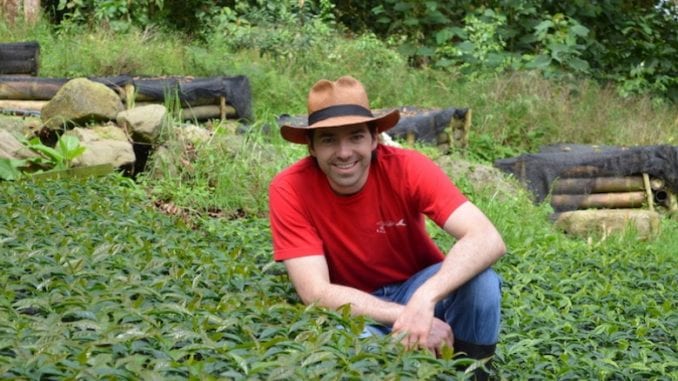
Here’s part one of our extended Q&A with two of the folks behind the famed Colombian coffee estate La Palma y El Tucan.
BY CHRIS RYAN
BARISTA MAGAZINE ONLINE
Photos courtesy of La Palma y El Tucan
In the new issue of Barista Magazine, we chatted with La Palma y El Tucan’s Felipe Sardi and Sebastián Villamizar for the “Master Q&A” feature, but they told us more fascinating things than we could fit in the article. In the first half of this two-part extended interview, Felipe and Sebastian chat about the farm’s name, working with the barista community, and more.
In 2011, Felipe Sardi and his wife, Elisa Madrinan, started La Palma y El Tucan, a coffee estate in Colombia’s Cundimarca Department. Their goal was not just to grow high-quality coffee, but to provide opportunities to their fellow Colombian coffee growers—with their inclusive model, La Palma y El Tucan (LPET) would not just cultivate coffee on their own farm, but would work with farmers in neighboring communities to improve their coffee quality, then pay above-market prices to purchase it.
Fast-forward to today, and La Palma y El Tucan have succeeded in positively impacting their communities while achieving global success. Their coffee is regularly used at high levels of coffee competition and purchased by roasters around the world, and a wide array of coffee professionals make regular visits to LPET’s sprawling grounds. Helping to get LPET’s name into the international coffee world has been Felipe’s cousin Sebastián Villamizar, who joined the team in 2015 and serves as head of marketing.
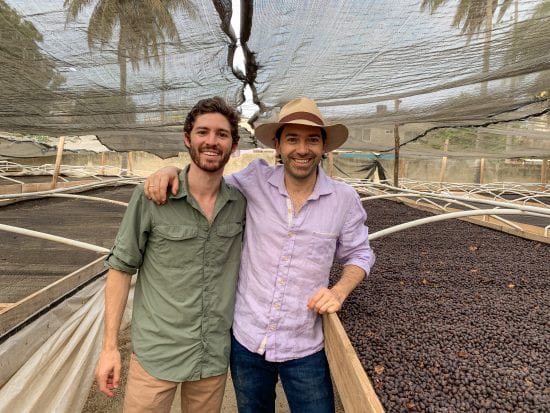
In the “Master Q&A” in the new issue of Barista, we chatted with Felipe and Sebastián to learn how the farm came together, why they’re committed to working with their local community and the global coffee community alike, and their feelings on the future of coffee. Now in part one of our extended version of the interview, they discuss the origin of the estate’s name, Felipe’s commitment to extended agricultural education, and more.
Chris Ryan: Can you tell me about the origin of the name La Palma y El Tucan?
Felipe Sardi: When we first set foot on what would become our land for growing specialty coffee, we invited a biologist friend to scour the terrain and to help us identify native flora and fauna. During the visit, we discovered that we had two rare species cohabiting the farm: the Emerald Toucan and the endangered Wax Palm.
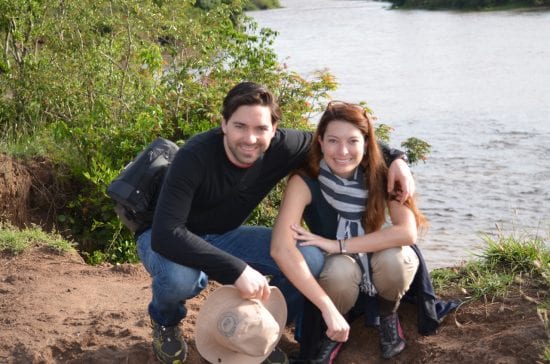
The fruit of the Wax Palm is an important source of food for the Emerald Toucan, and thusly the Toucan spreads the Palm’s seeds. The two are meant to be, but both species are challenged by habitat loss, which sadly is oftentimes driven by coffee plantations.
At La Palma y El Tucan, we strongly believe that some things are meant to be, and we do our very best to keep it that way.
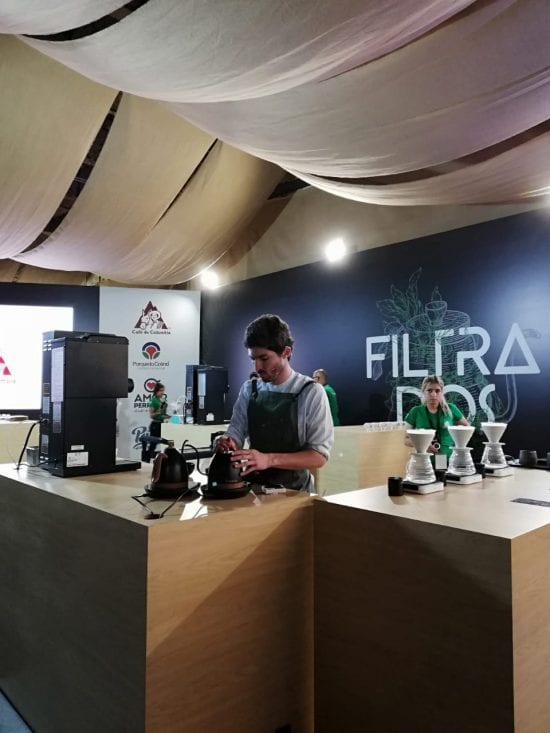
Felipe, you recently completed a graduate certificate in agricultural sciences from the University of Melbourne in Australia, as well as a permaculture certificate. What did you want to improve upon through these degrees? Can you give an example of something you’re doing at the farm now that you learned there?
I decided to pursue the degree at Melbourne University because their program stands out as one of the top agricultural programs in the world, and their focus on sustainability and application of new technologies inspired me to learn from them and expand my knowledge in the field. Furthermore, to complement my interest in sustainable agricultural practices, I decided to get my Permaculture Certificate from the Australian Permaculture Research Institute, through their Malaysian base in the Chalin Forest (deep in the Southeast Malaysian lands), where the Institute could offer an emphasis on tropical agricultural management.
My intention was to acquire valuable tools that could help me innovate at La Palma y El Tucan through the application of practices that could result in a more productive, resilient, and biodiverse coffee ecosystem. I believe in the power of nature—I always have—and learning how to design productive ecosystems inspired by nature’s efficiencies, and working with nature rather than against it, was a dream come true for me.
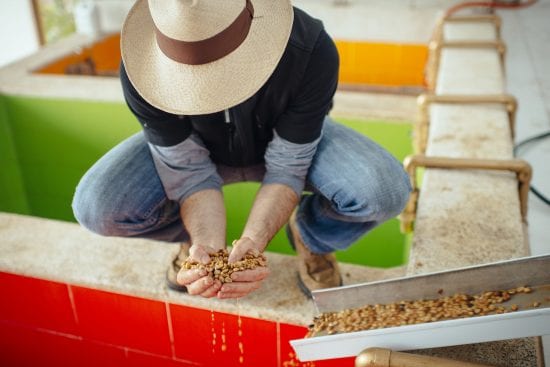
Since my arrival back at the farm, we have radically altered our agronomical approach to coffee farming, even if we’ve always maintained a high sustainability standard for everything we do. Probably the most drastic measure we’ve recently taken at La Palma y El Tucan was to cut down almost 50 percent of the entire coffee trees (over 20,000 productive Gesha, Sidra, and SL-28 coffee trees) to allow room for more biodiversity, bringing in hundreds of new plants and trees per hectare, representing over 24 species in total.
In other words, we’re turning a monoculture into a polyculture (which will soon look more like a forest than a coffee plantation), and relying on biodiversity, along with an intensive organic fertilization program, to provide much better results in terms of production yields and plant defense mechanisms. It’s a risky bet indeed, but worthy of an opportunity.
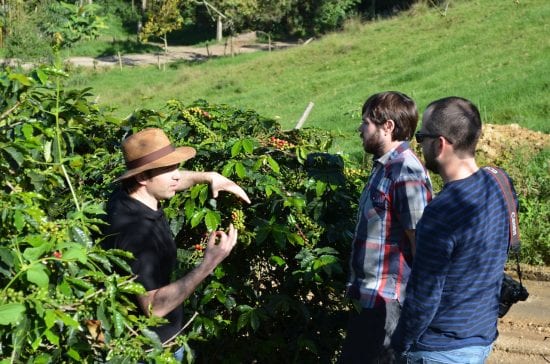
Sebastián, I understand that La Palma y El Tucan regularly hosts baristas at the farm; why do you do that, and how do you learn from each other?
Sebastián Villamizar: As coffee professionals, we have seen that there is a huge gap of knowledge and information between producers and baristas around the world, and we want to help close this gap by supporting baristas as much as we can. We believe they have a very important role and responsibility within the coffee chain, as they are called upon to create relationships that are built around trust and knowledge with the end consumers of our coffees. It is our belief that working side by side with baristas helps us all promote a sustainable industry for years to come.
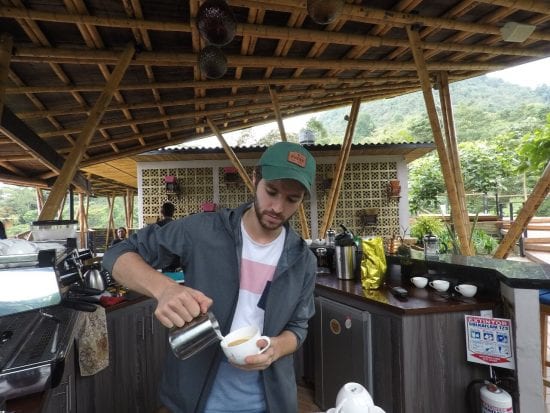
Through programs like Origin & Craft and events like the Glitter Cat trip, where we host baristas at the farm for days or even weeks, knowledge is transferred both ways. Not only do we share information about our farm and our production processes with baristas, but we also receive from them highly relevant feedback to further understand our industry and what end consumers are looking for. As long as we can continue doing so, our goal is to support these initiatives year after year; we believe that everyone involved in the coffee chain should have the opportunity to learn new things from other coffee professionals, and baristas are no exception.
Visit baristamagazine.com tomorrow for the second part of our extended interview with Felipe and Sebastián.

